‘No Longer Human’ by Osamu Dazai: My Searing Wake-Up Call
Good books teach you an awful lot about the world — cultures, philosophies, different thoughts and ideas. Great books teach you an awful lot about yourself.
I am unashamed to say that, these days, I’ve been overindulging myself in depressing East Asian literature. Last week, I finished A Pale View of Hills by Kazuo Ishiguro, a story retracing the postwar memories of a mother dwelling on her daughter’s recent suicide. The week prior, I read The Seventh Day by Yu Hua, a poignant tale about a man navigating the afterlife on the backdrop of a destructive, rapidly modernizing China.
Yes, it all crushes my soul to pieces (I have to recuperate by watching cat videos), but beneath the darkness I find it to be deeply therapeutic. I think that quality can be attributed to how Asian writers infuse their narratives with the sheerest transparency. It’s like bleeding on paper: they have no trouble laying their heart bare.
Their stories are raw and confessional, with jagged edges and ripped seams gleaming in unabashed glory. Most of all, their portrayal of mental health is so devastatingly relatable. As someone with wounds still fresh from battling inner demons—it makes me feel seen. When I read No Longer Human by Osamu Dazai this week, I felt seen like never before. But while it brought me more solace than a therapist ever could, it also forced me to confront the side of myself I didn’t want to see. And that’s how meaningful transformations are made.
Plot Outline
The story of No Longer Human unfolds through 3 memoranda, or “notebooks”, that trace the main character Yozo Oba’s descent down a bottomless spiral of depression, shame, and self-destruction.
The First Notebook: Childhood
Since birth, Yozo has perceived himself as an outcast, unable to understand basic human emotions and motivations. His stark alienation causes him to put on a mask and fabricate a “clown” persona to blend in with society. He recounts his successful clowning at school, but at home he is sexually abused by the house servants. However, he keeps silent and bottles up his pain. This is when his distrustfulness and fear of humans begin taking root.
The Second Notebook: Early adulthood
Yozo starts attending university in Tokyo, but his social anxiety hinders him from enjoying city life. As his mental health begins depleting, he turns to smoking, drinking, and sleeping with prostitutes. His lodging and allowances from his father were eventually cut, and he discovers he has no ability to support himself. Eventually, he meets a woman at a bar who was in a similar predicament. The two agree to commit double suicide; however, the woman died, while Yozo survived. This incident only heightens his ever-growing shame and depression.
The Third Notebook: Middle Adulthood
*The Third Notebook is actually divided into two parts, but I’ll summarize it all in one to keep things short.*
Yozo is expelled from university and moves into the home of a family friend, who he runs away from. His worsening depression leads him to fall into severe alcoholism. He later ends up entering a relationship with an innocent woman named Yoshiko. Unfortunately, Yoshiko is sexually harassed by an acquaintance, and Yozo witnesses the whole thing. Rather than seeking justice, he only falls deeper into despair—blaming himself for the trajectory of events. He ends up developing an addiction to morphine and is consequently checked into a mental institution. Once discharged, he comes under the care of an elderly woman in the countryside, where he spends the rest of his days rotting in a shell of shame and misery.
I know. Depressing, right? But, in Yozo I found waves of parallels to my life. The kinship I felt with his thoughts and self-image lit ablaze the start to my healing.
How Yozo’s struggles made me confront my own
This is the opening line of the story. I spent a couple seconds just staring at that line, imprinted in bold text at the beginning of the first notebook. “Mine has been a life of much shame. I can’t even guess myself what it must be to live the life of a human being.” It was then that the phantoms of my own shame crawled out between those lines of black text, plunging me straight into the icy, cavernous waters of self-confrontation. And as I progressed further into the book, I found myself dragged down hundreds of moldy corridors lined with decade-old shattered mirrors.
Like Yozo, the feeling of being “other” and the crippling alienation it strung along have haunted me since my most formative years. It became my leash—barring me from happiness and enmeshing me in a net of self-shame and insecurity. I hated myself for a long time.
I attended elementary school in China for a few years before coming to America and, let’s just say—I wasn’t the brightest student. Academic excellence is HIGHLY valued in Asian culture, so most students push themselves to overachieve in school from a young age. I, on the other hand, trailed 10 steps behind my peers. Slowest to think, slowest to learn. In fact, I dreaded learning because my attempts at it were always tainted by the cruel, sneering faces of my classmates.
I have the most vivid memory of when we were first learning how to stroke Chinese characters in the correct order. My brain never worked in the most orthodox of ways, and I began rotating my paper round and round, letting the strokes form sporadically from different positions. I thought I was being creative, but I quickly found that I was making a huge fool of myself. My classmates—who stroked theirs normally and with ease—all began snickering. Venomous whispers of “她是不是有点笨? (Is she a little dumb?)” echoed around me, and I felt myself growing smaller and smaller in the heat of both the stifling classroom and my own humiliation.
I was already ostracized for being the “slow” one of the class, and this farcical effort of mine (one among many) only added more fuel to the fire. My classmates constantly left me out, discarding and pushing me to the side because I wasn’t like them. I was an outcast simply because I was “less than.”
Numerous school reports of my futile academic performance later, my parents eventually rationalized I was just…mentally delayed. Even I began to believe that there was something innately wrong with me “from the moment I was born.” Did you know that the Japanese title of No Longer Human—”Ningen Shikkaku”—directly translates to “human disqualification”? At the puny age of 8, I felt like I was indisputably disqualified from being human.
.
I feel you, Yozo, I do. I was alienated, forced to choke on my shame for being the only one “unlike the rest.” I won’t specify any further, but some of the things those classmates said and did were so scathing that an acute fear of humans started taking root.
When I began school in America, it was quite literally “impossible for me to converse with other people.” I didn’t speak a single word to a single person in my class for an entire year; my teacher even thought I was mute. Only nods, shrugs, smiles, frowns—and the occasional crying in the bathroom stall.
I was actually pretty proficient in English then—ironically the ONE subject I was okay at in China was English—so it wasn’t a matter of language barriers. I was just scared of people. I feared they’d outcast me the same way they did back then, dare I expose my inadequate self. Don’t worry though, I was able to defrost myself after a while. Time did a good job stitching up my wounds as the years cascaded down like balmy spring rain (thanks, buddy). I ended up making friends and growing fully comfortable in my skin before middle school. Things were good. I just didn’t expect how soon the incisions would burst open—staining me again with the putrid, brown blood I foolishly thought had all dried up.
In around 6th grade, my mom enrolled me in math classes at our area’s Chinese School (a Chinese-American run program that offers free classes in academic subjects as well as arts; held at a high school every Sunday). She herself enrolled in the Yoga class, which was chock-full of other WeChat addicted moms. Our involvement here immediately thrust us into a front row seat within our local Asian American community. I was introduced to tons of kids my age who were STEM whizzes, piano prodigies, Carnegie Hall performers, and Scholastic Art medalists. Unbelievable. They were out gaining national acclaim while I was binging Disney Channel until 10pm every night and getting straight Ds on my math tests. Assuming I was the same as them, those kids all befriended me, and you have no idea just how terrified I was.
I shook with so much fright before my new dazzling Asian friends, fearing they’d find out I didn’t shine like them. If my inadequacy ever came to light, they’d surely look at me with disgust in their eyes and throw me away—a reminder that I was forever doomed to walk in exile as an outcast. I couldn’t bear to let my elementary days to repeat themselves, so, I decided to don a mask and make my debut in acting.
Yozo starred in his new role of the “farcical eccentric,” while I starred in my new role of the “star student.” The classroom became my stage, the spotlight my newly stacked straight As and seemingly vast pools of knowledge.
My mask was carefully crafted through late nights honing my deficient math skills; lunch periods making Quizlets; and weekends at the Barnes & Noble Café studying everything from school subjects to ACT strategies to Jungian psychology. I also tried to build a complex vocabulary—I’ve forgotten all of those silly big words now—to impress my friends and classmates. By sounding smart, I eventually tricked everyone into thinking I was smart. Remember, it was all acting; I was an actor. A self-made prodigy in the art of deceit.
Yozo and I were both met with great success in our performances. Even the smartest kids in my grade began seeking me for homework help and using my study guides and Quizlets. Word spread in my mom’s WeChat group chats that I seemed such a dedicated student, always on the honor roll, and was winning awards at art shows, etc. I basked languidly in my standing ovation.
When I transferred to Great Neck South for high school, I thought I’d fit snugly in the bottomless throng of overachieving Asian kids. Only, this wasn’t a tiny community theater like my old school, where self-made actors like me could be shining stars—this was Broadway.
I found that I was not effortlessly intelligent like my classmates, who articulated themselves so sharply in class discussions and took in material like a sponge. I found that I had to drown in endless hours of studying in order to appear afloat, while my friends were balancing sports and Science Olympiad and still achieving higher grades than me. I found I was not sound with relief when handed back an A on a difficult test, but instead horror-stricken at the sound of my mask beginning to crack and chip away.
Nevertheless, I continued to wear my mask dutifully, but all the shame and self hatred I buried under that tight space eventually dug themselves out of their graves to eat away at my mind.
I can’t go into detail, so let’s just say that I began free-falling down a similar path as Yozo (minus the morphine addiction and prostitutes). No worries, I’ve since recovered and am in a good place now, but the ingrained sense of shame that caused me to free-fall in the first place affects me even now.
I had many “oh” moments throughout my time reading this book, but this passage was by far my biggest “oh” moment of all time.
I realized I have this ingrained habit of considering myself “less than,” stemming all the way from my elementary years. It made me hate myself, and I became blind to my own strengths. It’s ridiculous how many opportunities I’ve missed out on because I was too afraid to ask my teachers for a recommendation, assuming I wasn’t good enough, and that they’d look down on me for even trying.
In the end, Yozo rotted inside his own shell, never allowing himself to break out. His deeply ingrained sense of shame had shattered his reflection permanently. It made him hate himself, and in doing so, he became blind to his strengths and turned his back against the many better paths he was capable of going down instead.
Seeing Yozo’s (albeit tragic) story unfold inspired me to begin deconstructing my warped self belief system. This book really woke me up, shaking me by the shoulders and shouting that I mustn’t be so harsh on myself. I mustn’t cage myself in an unbreachable shell of shame and self-hatred when I could be—no—I am so much more.
After the 3 notebooks, the epilogue features a third party who visits the bar Yozo had spent some of his darkest nights at. We learn that the narrator had borrowed the notebooks from the lady who works there; she was sent them in a parcel ten years ago, most likely from Yozo himself. When the narrator laments Yozo’s miserable existence, the bar lady said this in response:







Jessie Boshnack-Roth • Jun 12, 2023 at 7:39 am
I’m gonna miss your writing so much pls don’t leave Jenny